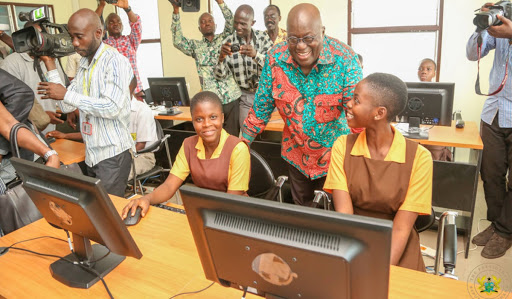Information and Communication Technology (ICT) is perceived to drive the growth of modern economies. The rapid development of technology globally has affected all spheres of human life – notably in agriculture, medicine, education, communication, records keeping and management etc.
In an attempt to embrace this global phenomenon and to build the capacity of its human capital, Ghana in 2008, made some good investment and drafted policies that helped the country utilize technology for its economic growth.
As a result, the inclusion of ICT into education, is now part of a strategic Plan of Ghana Education Service. The Government of Ghana (GoG) has also introduced an intervention programme dubbed ‘One Laptop per Child Policy’ to sustain the interest of pupils in ICT as well as enhance teaching and learning in basic schools. Several basic schools have already benefited from this policy.
However, there is still more work to be done in this area. A high number of pupils still do not have access to computers. Many basic schools still lack the adequate facilities to enable them to facilitate ICT training to their students.
The introduction of ICT usage, integration and diffusion at such level has initiated a new age in educational methodologies. Subsequently, it has extremely changed traditional method of information delivery and usage as well as offering contemporary learning experience for both teachers and students.
It can be concluded that, the deployment of ICT in education contributes to effective learning through expanding access, promoting efficiency, improving the quality of learning and improving management systems of schools. Ghana is however, yet to derive the maximum benefit that other developed economies (Countries) have gained from investing in ICT education.
Introduction of ICT in education
Information Technology (IT) refers to all equipment, processes, procedures and systems used to provide and support information systems (both computerized and manual) within an organization and those reaching out to customers and suppliers (Shelly et al, 2006).
The term information and communication technology (ICT) was coined to reflect the seamless convergence of digital processing and telecommunication. ICTs include hardware, processes and systems that are used for storing, managing, communicating and sharing information (ICT in education policy, 2008). ICTs are indispensable and have been accepted as part of the contemporary world especially in the industrialized economies or countries.
The pervasiveness of ICT has brought about rapid change in technology, social, political and global economic transformation thus, cultures and societies must adjust to meet the change of the knowledge and digital age. It is widely acknowledged that ICTs can be used to improve the quality of teaching and learning in schools.
Amenyedzi et al (2011) conducted a study in the Tema, a metropolis in Ghana, to assess the usage of computer and internet as a supplementary educational material to enhance quality education; help improve educational management and planning; how students use computer and internet to facilitate their learning. The stratified sampling method was used to select students and teachers. The results showed that a significant high percentage of 92% of the respondent teachers were computer literates and 78% of the respondent students also had basic knowledge in computer.
However, less than 15% of these teachers used the internet as an innovative way of improving teaching and learning. Over 30% of the teachers also used the computer mainly for research work. Despite the limited use of computers by teachers in their teaching, many agree that the computer has changed the way students learn.
One fourth of teachers have received some form of training in the use of computers, with quite minimal training in the pedagogical integration of ICT. It appears that integration of ICT in Ghanaian schools is a major step in promoting innovation. From the on-going discussions, it can be concluded that the adoption of ICT in education has become a necessity rather than a choice.
This suggests that, the present and future academic community will utilize ICTs to a higher degree. In other words, it is essential for both teachers and students not only to know how to use ICTs, but they need to become comfortable with using them.
The role of ICT in teaching and learning
ICTs are powerful and essential tools for learning, understanding, interpreting and communicating about the real world. Effectively used, ICTs can amongst other things: provide multiple avenues for professional development for both pre-service and in-service teachers, especially through distance education.
This means as the teachers acquire the skills using the ICT related tools they would be able to impact it on the pupils. The application of ICT can also help to improve educational management processes because all the core activities would be managed with the use of management information systems.
In addition, the use of ICT could improve the consistency and quality of instructions, both for formal and non-formal education, and increase opportunities for more student centered pedagogical approaches that is promoting education by addressing inequalities in gender, language, disability among others.
Furthermore, the use of ICT has widen the traditional sources of information and knowledge by fostering collaboration, creativity, higher order thinking skills and providing flexibility of delivery of lessons as well as reaching a wider range of student population outside the traditional education system.
However, effectively integrating ICTs into educational planning and delivery can be a complicated process, leading to further disparities and challenges in the system. These may include lack of focus on educational objectives where ICT in education policy can help implement solutions within a coordinated end to end system-by looking at the combined inputs of educational objectives and multi-stakeholder.
Students become more aware of how to learn when using ICT because they must interact with the computer. ICT has also changed relationship between students and teachers and has made it open and intimate. The idea of sharing knowledge and the capability of using new sources for learning are enhanced by using ICTs mostly at the tertiary level of education in Ghana.
This is due to the fact that, there is a national policy supporting ICTs in schools, lecturers and students will then fall closer to the rest of the world. ICT has changed students’ curiosity, motivation and preparedness to seek further education. However, there still remains more work to be done to improve the ICT training and the use of ICT in lesson delivery at the basic level.
Challenges of deploying ICT in the educational sector
Planning for the effective use of these technologies is crucial if they are to have the positive impact expected. Investing in ICT is a costly decision for any country, whether developed or developing. For developing countries such as Ghana, investing in ICT presents the dilemma of spending scarce resources on ICT or consequently suffering from widening technology gap.
The ultimate objective of the Ghana ICT for Accelerated Development (ICT4AD) is to ‘accelerate Ghana’s socio-economic development process towards the realization of the vision to transform Ghana into a high income economy and society that is predominately information-rich and knowledge –based within the next two or three decades” (Ghana ICT4AD Policy, 2008).
In the Ghanaian basic and secondary levels of education, conventional teaching practices are still the usual way of teaching. If you were to compare a classroom fifty years ago to an average classroom today, you would recognize immediately, not much has changed with regard to the delivery of lessons and the way students study. Whilst much has been changed by the introduction of ICT and the way that students and teachers interact in the classroom mostly in developed and some developing countries, ours have remained largely unchanged.
Another challenge is teacher training. In past times, schools have been provided with expensive equipment but with little or no support for teachers’ professional development in ICT and national ICT-in-education policies. Teachers are also not conforming to the changing trends of ICT integration into schools. It is only the ICT subject teachers that are conforming to change.
Inadequate supply of computers in ICT laboratories in schools in both the urban and rural areas. In a recent survey of teachers in some developing countries conducted by Scientific Research Institute (SRI) International for World Links, pointed out that majority of teachers in African and Latin American countries reported that, lack of adequate hardware and software coupled with unreliable internet access were significant barriers to using computers in lessons.
This report reflects to the fact that many schools in developing countries including Ghana have a student-teacher ratio as high as 80:1, and must contend with a computer lab often with about an average of 20 computers for an entire school.
Conclusion
It can be concluded from the above argument that, the integration of ICT into education brings about countless benefits with regard to the quality of teaching and learning. There have been also other researches in Finland indicating the introduction of ICT to children at an early age, helps improve their intelligence and other cognitive abilities significantly. The training of students in ICT also gives them the very useful skills needed in today’s digital world in order to make them productive and employable.
Since the use of computers have a positive effect on the performance of students, it is also imperative for the government to put measures in place to sustain such a policy and also extend it to all municipal and rural areas in the country. The Ghana education Service should put in place stringent regulations which makes IT literacy a requirement for teacher qualification.
The government should invest into ICT infrastructure in basic schools, which makes classrooms IT equipped and configured with access to internet. This would enable teachers to employ the usage of IT in the delivery of lessons. Teachers should be specifically trained in the usage of ICT in the delivery of lessons (including videos and other audio – visual aid) to students in order to enhance learning experience.
Government may form partnership with IT training institutions to regularly train students and current teachers in basic schools, to enhance their IT skills, and introduce new technologies that are relevant to learning and delivery of lessons respectively. Government should also ensure that all computers or laptops provided to schools are technology compliant, with modern and child-friendly facilities which can support teaching and learning in all basic schools in Ghana.

>>>the writer holds MS in International Trade and Economics. He can be reached [email protected]. https://www.linkedin.com/pulse/impact-ict-training-basic-schools-ghana-martin-agyeman-kankam-boadu/










